30304 distinguishing similar words
Bạn đang xem bản rút gọn của tài liệu. Xem và tải ngay bản đầy đủ của tài liệu tại đây (41.9 KB, 2 trang )
Distinguishing between similar words.
A) arise (arose, arisen), raise (raised, raised), rise
(rose, risen).
Only raise can have an object. Arise is used to mean
“come into being”
e.g: New problems are arising every day.
Use the correct form of raise or rise in the following
sentences.
1. The goverment has just..............taxes, and prices
are.................too.
2. Arkady...................the major to his feet.
3. They...................when she came in.
4. His temperature has .......................since last night.
5. All my family were ...................on porridge for
breakfast and I’ll .......................my children the same
way.
C) lay (laid, laid), lie (lay, lain)
Lay has an object: lie does not.
Use the correct form of lay and lie in the following
sentences.
1. He ........ ........in a ditch and I .............his coat on top
of him.
2. The smoke .................between Arkady and safety.
3. ...................down, and you’ll feel better!
4. ..................it on the table, please!
5. The choice..................in wether there is an object or
not.
E) fog, haze, mist, smoke, steam.
Choose the correct word to complete the following.
1. ..............is like a cloud near the surface of the
Earth; ..............is the same but less thick.
2. Boling water produces ..............., but fires
produce .................
3. Hot weather sometimes creates a .............which
makes it difficult for us to see clearly.
4. Smog is a form of industrial pollution, a mixture
of................and smoke. (It is a word formed by two
others in the list)
G) guide, instruct, learn, teach, train.
B) forget, leave, neglect, omit.
Use each verb, at least once in the correct form to
complete the following.
1. a. Oh dear! I’ve .................my books.
b. Oh dear! I’ve ..............my books at home.
2. How old were you when you ............ school?
3. I’ve....................all the Latin I learned at achool.
4. If you.................your work, you can’t hope to pass the
exam.
5. You haven’t filled in the form completely.
You’ve ..............your name.
D) allow, leave, let.
Use these verbs in the correct form to complete the
following.
1. a They don’t.....................you smoke here.
b You aren’t ....................to smoke here.
c We don’t .....................smoking here.
d We don’t ..................people to smoke here.
2. a I’ll ................you stay up late tonight.
b. I’ll .................you to stay up late tonight.
3. Don’t worry about the washing-up! ................it to me.
4. Children shouldn’t be...................alone in the house
at the age of three.
F) crusty, raw, rough, rude, rusty, tough
Use one of these adjectives to describe each of the
following.
1. behaviour that is impolite.......................
2. bread with a firm outer covering....................
3. a chain left out in the rain.....................
4. an idea that is not yet exact....................
5. materials before processing. .....................
6. meat that is hard to eat.....................
7. meat that hasn’t been cooked.................
8. play that is storng and determined..................
9. Play that is unfair....................
10. shoes that are hard-wearing. ...................
11. a surface that is uneven....................
12. unpleasant weather.....................
H) commemorate, memorize, remember, remind.
Use each verb, at least once, in the orrect form to
completethe following.
Use each verb, at least once, in the correct form to
complete the following.
1. Mr. Ellis ....................the police a lot.
They ...................from him how to prepare cases, using
the evidence of voices and accents.
2. Mr. Ellis .....................phonectics at Leeds University.
He....................students on the frequency of certain
speech patterns and they ....................(2 possibilities)to
recognize them.
3. There are schools where blind people are .................
how to use guide dogs. The dogs are ...................(2
possibilities) to ........................them through traffic.
1. Do you ................that party at Sarah’s last year?
-Yes, now that you ...............me I.................driving home
in the snow. It ..................me of Christmas in my
childhood.
2. Wellington Street........................the Duke of
Wellington.
3. I’m.......................my lines or the school play. I hope
I........................them on the night.
4. ......................to post that letter tomorrow. It’s very
important.
-Ok. But ......................me to post it in the morning. I
may forget.
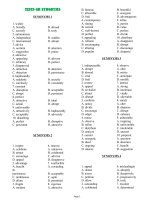
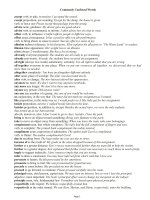
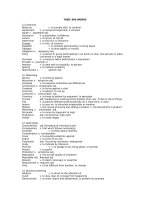
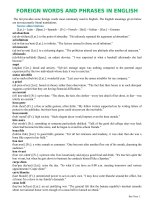
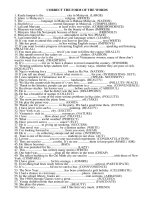
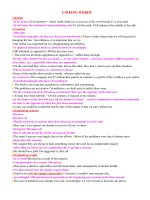
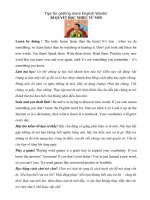
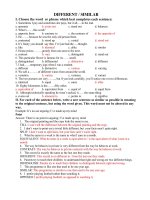
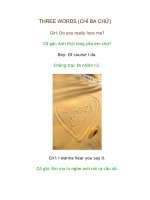
![[TieuBaoan] Confused Words...Những từ gây nhầm lẫn](https://media.store123doc.com/images/document/13/gu/nh/medium_PdPy5OdVli.jpg)